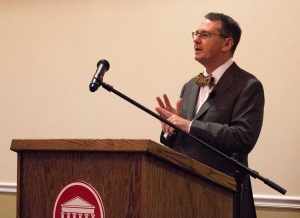The last of four planned provost candidate open forums commenced Friday at the Inn at Ole Miss with Craig H. Kennedy presenting. Kennedy focused on moving the university forward by providing a quality education to all students, increasing diversity and retaining faculty.
Kennedy currently serves as a professor in the Department of Communication Sciences and Special Education and is the dean of the College of Education at the University of Georgia. His research focuses on social relationships and aggression with autism and neurodevelopmental disabilities. He has won multiple awards, including the B.F. Skinner New Research Award from the American Psychological Association.

Craig H. Kennedy is the last of four provost candidates to speak at the Inn at Ole Miss. Photo by Baylee Mozjesik
Kennedy highlighted five areas he would want to focus on as provost: undergraduate education, graduate education, faculty, diversity and staff.
Kennedy first discussed how increasing applicants can help the university grow in more ways than just sheer population.
“The greater your applicant pool, the more selective you can be of your students coming to your university,” Kennedy said.
One way to receive more applications is to increase need-based scholarships.
“In Mississippi … There’s an extraordinary number of young people who want to come to the University of Mississippi who are intellectually very talented, very motivated, but they do not have the resources to pay tuition, books, fees and so on,” Kennedy said. “That financial barrier often keeps them from attending the university or being able to complete their degree.”
Kennedy noted that providing more need-based scholarships causes the quality and quantity of the students at the university to increase.
Offering a dual degree program, combining bachelor’s and masters degrees, was another plan noted in Kennedy’s speech.
“Most of our undergraduates are coming in … with a year of advanced placement credits; they’re essentially coming in as second year students,” Kennedy said. “If they’re coming in as second year students, they have the opportunity to add a degree.”
Through this new program, Kennedy has seen students graduate with two degrees within four or five years.
Although university growth was a main topic of discussion, Kennedy stressed that growth is not the only important thing at a university.
“Don’t grow simply to grow,” Kennedy said. “Grow because you can move your institution forward by developing these new programs.”
Kennedy said keeping successful faculty and staff at the university would help better the university. He said named professorships are a way to thank professors for what they have done for their school and students, while also continuing to promote education.
“We, on the academic side, use the resources as recruitment opportunities … and it actually has a profound affect on the retention rate of faculty,” Kennedy said.
Kennedy also touched on the topic of diversity and how Ole Miss, along with many other universities, can benefit from increased diversity around campus.
“It’s about bringing out people’s talents, and bringing out people in the community that might not have otherwise participated,” Kennedy said.
“It’s important to realize that when we’re talking about diversity and inclusion, we’re talking about a lot of different groups,” Kennedy said. “First-generation college attenders, women, people from underrepresented backgrounds … The more that we can reach out to these communities, there is a greater access to talent.”
“If we don’t do that, frankly, we are losing a substantial portion of the talent that we have in our communities.”
Some students from the university’s School of Education seem to be excited about the potential of having a provost with an extensive background in special education.
“I think it would be so beneficial to have a provost with a background in special education like Dr. Kennedy,” graduate student Kelley Hansbrough said. “He brings valuable experience from being the chairman of special education at Vanderbilt. This experience is so useful for Ole Miss and can potentially set us apart from other colleges. In a way, this is attractive to students that may come here with a disability.”
Grad student Jack Burton, who is pursing a master’s in special education, said Kennedy’s education background, especially with special education, sets him apart from the other candidates.
“It’s crucially important to know what’s best for a wide variety of students in a field that is constantly changing,” Burton said.






